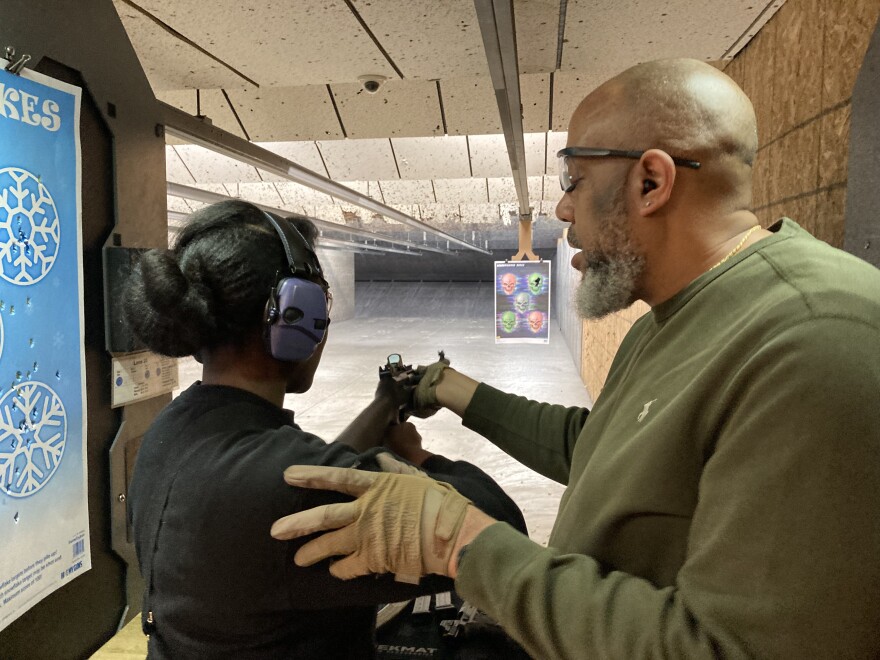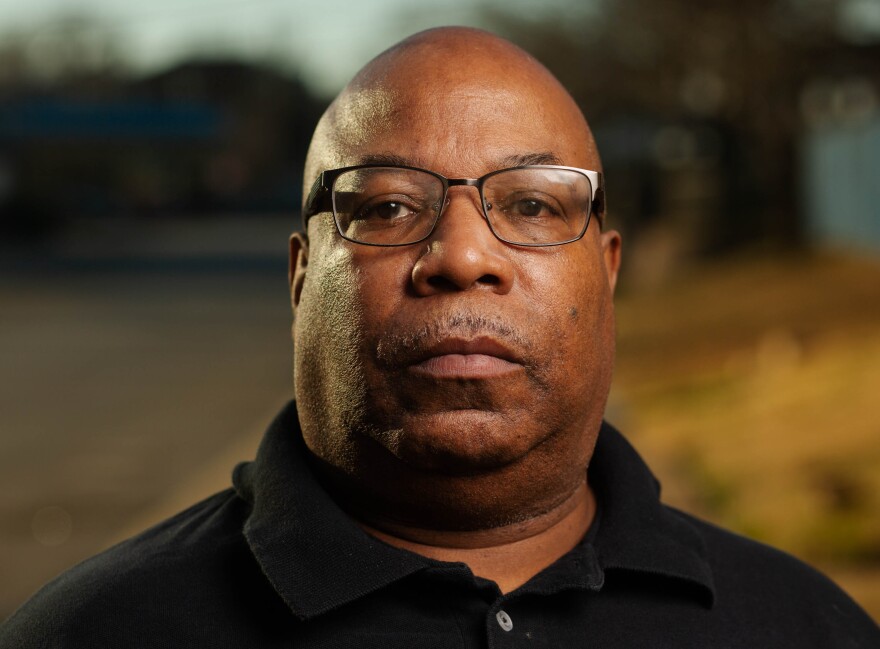When Russell Lewis wants to unwind, he heads from his suburb of Florissant, Missouri, to the SharpShooter indoor gun range in St. Louis.
On an early winter Saturday, Russell takes aim at paper targets, including one labelled “Snowflakes,” and fires his Panzer Arms M4 12-gauge shotgun. It gives off a deafening blast, and a recoil you can feel from several feet back.
“It’s just something about the power and being able to release that and let it go downrange,” Russell says. “It’s just a nice thing to do. It relaxes me.”
Russell’s wife Sharis came to practice with her new handgun, a SIG Sauer P365. She’s been worried about increasing crime in St. Louis, which recently had the highest murder rate in the U.S., and said learning to use a firearm made her feel safer at home.
“I kinda feel like the door now is for the person on the other side of it,” Sharis says. “That’s for their protection. Because this is a peaceful place for us, and now I can defend that peace.”
Keeping homes safe
Sharis and Russell are part of a quickly growing cohort of African American gun owners. Nationwide, surveys found that 25% percent of Black adults owned a gun in 2021, up from 14% just six years ago.
The state of Missouri doesn't require a license to buy a gun. And most adults can carry firearms without permits in many public places.

But even gun enthusiasts say that new owners often lack the information needed to keep themselves safe — especially when it comes to suicide prevention. Homicides in Missouri recently reached a record high, spurring even more people to buy guns, but the number of suicides in the state was even higher.
That’s where Bill Mays comes in.
Strolling into a St. Louis pawn shop, Mays gave a cheery greeting on his way to the gun counter in back. He makes regular visits to spots like this across the city, to restock safety pamphlets and talk with shop owners.
As a firearms trainer and a concealed carry advocate, Mays has been part of the St. Louis gun community for years. He says he knows how to talk with fellow gun enthusiasts in ways that health experts usually can’t.
“It’s a matter of, if it walks like a duck, talks like a duck, then what is it? I’m a duck!” Mays said. “So I can talk. But if you come in there and you a hen and you talking to ducks, they not gonna understand that language.”
Mays is Black, and part of the Safer Homes Collaborative, a project based at the University of Missouri–St. Louis involving gun owners across Missouri. They’re hoping to convince gun sellers, owners and their families to help keep firearms temporarily out of the hands of people in crisis.
Suicide is usually an impulsive act. Nearly half of survivors say the time between first considering suicide, and making an attempt, was 10 minutes or less. If someone is kept away from a means of killing themself for even a short period of time, their risk of dying can drop dramatically.
“That’s the thing about suicide, is that you can have that feeling, but if someone intervenes, you know, that feeling can easily go away,” Mays said.
Firearms are a main focus of suicide prevention efforts because they are more deadly than other methods. Nine in 10 people who attempt suicide with a gun will die.
Missouri's Safer Homes Collaborative is modeled on the New Hampshire Gun Shop Project, which sought to soothe any fears about stepping on Second Amendment rights by involving gun owners to deliver the message about means reduction.

But this message still doesn’t always go over well with gun rights advocates, and Mays' charm is sometimes put to the test. On one visit, a shop owner told Mays that his materials were no longer welcome.
“I went to a shop and the guy said, ‘We’re not doing that anymore, because we don’t want that anti-gun stuff in here,’” Mays said. “I’m like, ‘C’mon, are you kidding me? You know this is not no anti-gun! Would I be talking to you?’”
Mays is not easily discouraged. He knows from personal experience how even small actions can save lives.
A few years ago, Mays says he struggled with suicidal thoughts himself. He remembers one episode when he was on the verge of taking his life. But he says a phone call with his daughter pulled him out of the crisis.
When Mays signed on with the Safer Homes project, he told project director Katie Ellison he was worried about where this growing gun ownership was leading.
“I told her I think in the near future, suicide’s gonna be big among African Americans,” Mays recalls.
'The model gun owner'
For decades, older white men have had among the highest rates of suicide, in part because of high rates of gun ownership. Having a gun in the home increases suicide risk for everyone who lives there by two to five times.
Since 2012, however, suicides among young Black men have increased by almost 50% nationally. And suicide rates for Black children aged 5 to 12 climbed to more than double the rate of white children.
While overall suicide rates for white Americans remain much higher than for African Americans, Deb Azrael, associate director of the Harvard Youth Violence Prevention Center, says it's past time to update assumptions about who owns firearms — and who's at risk for suicide.
Azrael coauthored a new study estimating that from 2019 to April 2021, around 16 million Americans had guns introduced to their home for the first time. Of the new buyers, 21% were Black.
“The model gun owner has already been a White guy," Azrael said. "That’s the vision that people have, and to the extent that who the gun owner we’re thinking about, when we’re thinking about who’s at risk for suicide, has changed, then it’s really important that there be efforts to reach out to new populations of gun owners — to women, to African Americans, to Hispanics — who are newly exposed and exposing other to the risk of a gun in the house."

In St. Louis, Reba Rice-Portwood has been urging her neighbors to recognize the shifting trends.
“When someone would die by suicide, and if we heard about it on television, or we read about it or something like that, we would always assume that it was a Caucasian,” Rice-Portwood said.
That assumption was broken when she lost her son, Ricky, to suicide in 2014.
Rice-Portwood said Ricky had an “old soul.” He loved Sam Cooke and looked out for older people in his mother’s apartment complex, but Reba says her son was also tormented by depression.
On September 17, Reba got a frantic call at work from her son’s fiancé, who told her that Ricky had shot himself.
Ricky died later that day at a hospital. He was only 22.
“What did I do so bad in this life for God to allow my son to pass?” Rice-Portwood asked.
In the days following her son’s death, Rice-Portwood grappled with shock and grief. She strained to understand how her son, who was known to struggle with his mental health, managed to obtain a gun.
And then came surprising news: Ricky’s fiancé discovered she was pregnant.

Today, Rice-Portwood is raising her grandson, Jackson, who’s six years old. On a Saturday morning at her apartment, he shows off his multiplication skills on a tablet while his "granny" beams.
A former jail worker, Rice-Portwood is now a counselor, and she's outspoken about the need to address trauma among young African Americans in St. Louis. She grapples with how to stop the spread of gun violence, especially when the proliferation of firearms in her community seems impossible to contain.
Despite what happened to her son, Reba still keeps a .380 pistol in a safe at home. She says she’s held on to it for one big reason.
“Fear. Like, actually I went to the grocery story about three weeks ago, you know, and was almost car jacked,” Rice-Portwood says. “That’s the reason why I still have it now, because I was like, it’s just too much going on.”
'Who's going to help?'
For Bill Mays and his friends, discussions about self-defense and guns have taken on increased urgency.
At Bang Good BBQ, next door to the SharpShooter range, Bill Mays meets up with Russell and Sharis Lewis. After placing lunch orders, they launch into talking about firearms, the Kyle Rittenhouse case, and other recent incidents of violence against African Americans.
Living in St. Louis, a city with a strained relationship between police and Black residents, Sharis sees double standards in law enforcement and justice. Those reinforce her belief that carrying a pistol has become a requirement for her personal safety.
“Me calling the police officer for help, I’m probably not going to get help,” Sharis said. “I have to be able to explain that I’m the victim. And as soon as they show up to the scene, ‘I called you. I’m the one that needs the help,’ you know what I mean? So, who’s going to help?”
Mays says he’s felt those safety concerns too. But his work in suicide prevention, and renewed interest in religion, has changed his personal relationship with firearms.
“I think a lot about the Bible. And the experience with Jesus — would Jesus walk around with a firearm? Of course not,” Mays said. “But it’s more than that. It’s just a point of – I don’t want to hurt anybody. I don’t want anybody to hurt me, but I just don’t want to hurt anybody like that.”
Though he no longer carries a gun, Mays wants to keep helping the people who do — and hope that those tough conversations might prevent another suicide death in Missouri.
If you or someone you know is in crisis, please contact the National Suicide Prevention Lifeline any time by calling 1-800-273-8255 or texting “HOME” to 741741.






